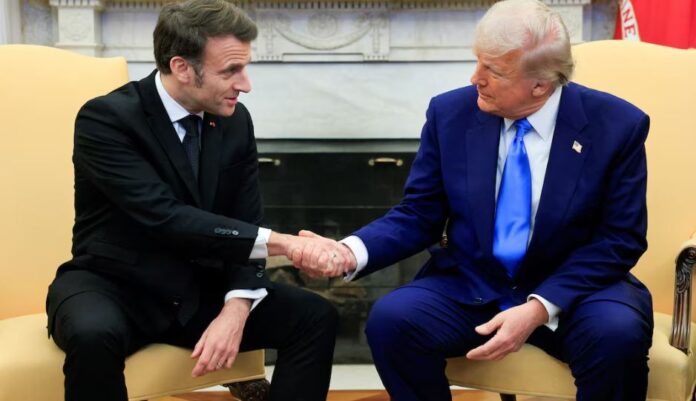WASHINGTON: U.S. President Donald Trump and French President Emmanuel Macron laid bare their differing approaches to the Ukraine conflict on Monday, underscoring a growing rift between the United States and Europe over Trump’s push for a swift ceasefire agreement with Russia.
Despite maintaining a cordial rapport during high-level talks at the White House, Macron made clear his opposition to key aspects of Trump’s stance on Ukraine as the two leaders marked three years since Russia’s full-scale invasion in 2022.
Trump notably avoided labeling Russian President Vladimir Putin a dictator, following his recent remarks referring to Ukrainian President Volodymyr Zelenskiy in such terms. In contrast, Macron took a firm position, stating unequivocally that “Russia is the aggressor” in the war.
“President Putin violated the peace,” Macron said during a joint press conference with Trump.
“President Putin violated the peace” — Macron
Diverging Views on Ceasefire Strategy
Trump reiterated his desire for an immediate ceasefire and indicated he was working toward brokering a deal between Kyiv and Moscow. He suggested he could travel to Russia for direct talks with Putin once an agreement is reached.
Macron, however, advocated a more structured approach, emphasizing the necessity of a truce before any comprehensive peace deal is finalized. He insisted that such an agreement must include security guarantees and undergo rigorous assessment.
“We want peace, he wants peace. We want peace swiftly, but we don’t want an agreement that is weak,” Macron told reporters. “Any deal must be assessed, checked, and verified.”
Agreement on European Peacekeeping Role
Despite their differences, both leaders endorsed the idea of European peacekeeping forces deploying once a peace settlement is reached. Macron clarified that such forces would not engage in combat but would serve to ensure compliance with the agreement.
“They would not be along the front lines. They would not be part of any conflict. They would be there to ensure that the peace is respected,” Macron stated during a White House meeting with Trump.
Trump signaled his acceptance of the proposal and suggested that Putin would not oppose it. “Yeah, he will accept that,” Trump said. “I specifically asked him that question. He has no problem with it.”
Ukraine’s Mineral Wealth at the Forefront
Trump also reported progress in discussions over a revenue-sharing arrangement with Ukraine, aimed at recouping funds allocated by the previous Biden administration for military aid. Under the proposed agreement, Ukraine would provide mineral resources in return for continued U.S. support.
Zelenskiy, however, has pushed back against Washington’s reported demands for $500 billion worth of mineral rights, arguing that the figure far exceeds the total military assistance provided to date. He has also raised concerns over the absence of concrete U.S. security guarantees within the proposed deal.
Trump stated that he expected Zelenskiy to visit the United States in the coming weeks to finalize discussions.
Territorial Concessions and European Concerns
When asked whether Ukraine might be required to cede territory to Russia as part of a settlement, Trump responded, “Well, we’re going to see.” Macron, in contrast, reaffirmed that any peace deal must uphold Ukraine’s sovereignty.
British Prime Minister Keir Starmer is set to visit Trump later this week amid growing apprehension in Europe over Washington’s evolving position on Ukraine and Trump’s outreach to Moscow.
The diplomatic meetings come at a crucial juncture, as European leaders seek clarity on U.S. policy under Trump’s renewed presidency and its implications for transatlantic security.



